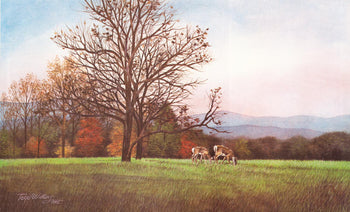The Mountains - by Sharon Hurst
 Painting; "Peaceful Fields", from the collection of Terri Waters Gallery.
Painting; "Peaceful Fields", from the collection of Terri Waters Gallery.
The Mountains
From their beginning, so many millennia past, autumn has swept the Smokies in each year, transforming the mountains with stained glass - colored leaves under cathedral blue sky ceiling. The young Smokies grew into their prime - thick forests of giant trees that touched clouds, fields of wild grasses grown crisp brown in autumn weather. Faded leaves, once brilliant, fell to the ground, leaving bare-limbed trees like skeletons standing in the gray ghost mists of morning.
October, even before it had a name, came to the mountains in a whisper. Bushy fox and fat black bear padded softly on the dark, damp earth, disturbing nothing in their search for winter dens among rocky crevices or hollow trees. Elk and deer, glossy black crows ... all migrated to the low valleys where sunlight warmed away the bitter chill of their high peak homes. They headed together, in fields thick-edged with trees, sheltered from cold and the occasional predator. Time grew short with each successive day; dry leaves peppered down from the trees, and somehow each wild creature sensed the coming of winter and the urgency for survival.
Few sounds echoed in the calmness of the Smokies then, for now men made that wilderness home, save a band of Overhill Indians who respected and worshipped nature. Quiet was broken only by a panther's snarl, angry as he stalked prey to provide strength for his lean winter ahead. Flocks of birds flew silent on the wind, black wide fans outspread across the sky. Should man or beast have come into that forest, the mountains would have spoken somehow not in words, but in the creaking of an ancient tree bent against the wind or the methodical tap-tap-tap of a woodpecker on a hillside. The mountains had a voice, in autumn or any season seldom heard, for few men ventured there.
Autumn could have gone like that forever, with wild creatures seeking havens as days grew sharp and bitter, making tracks in thin crystal frost that powdered fallen leaves. But there came intruders, unexpected, and the mountain voices hushed. Long Hunters walked the Smokies, their knee boots leaving foot prints in virgin soil, of trees and glimpses of creatures who hid themselves away. The morning wind stilled for a moment, as the forest watched these strangers in their journey. Yet the Long Hunters pressed onward, seeking a deeper wilderness. They left the forest unmolested; no trees felt their axes, nor was more running game killed than could be eaten in their hunger. The Long Hunters moved on, like the wind itself, leaving the mountains unchanged.
But men came who did settle the Smokies, who touched the wilderness and carved themselves a home. And they heard the voices in the autumn the voices that ran down mountains like silent laughter wandering the hills; it was the voice of icy rivers, a thin musical voice dashing fiercely against gray-back boulders in frothy rage, then suddenly changing tune, running smooth like a gentle song that quiets the night's children. The brittleness of crisp leaves underfoot, the silence of dewdrops bathing clusters of low lying ferns. And the voice was the night wind high upon LeConte, drawn across the firs like a bow upon violins. A scuffing of footsteps in a pale morning frost, the mountain voice spoke, or in the windless glide of a hawk, born upon the mists of autumn mornings.
Men heard the mountains given many tongues; wind, rain, the gentle falling of sunshine. Or in the brittle cold light of stars, icy, hard pinpoints in a cloud-massed, moonlit sky. When a panther's cry drifted through the ridges like a woman's scream, or wolf howls from a nearby crag made the hair stand on end. Night voices in the half-light, frightening, yet somehow comforting, for the mountains were yet speaking, even beyond sundown. And the same stars light our nights these years, the voices that sang to our fathers can be heard or felt more silent than before. Beside the ice-edged river, upon a steep rock slope, beneath an aging poplar, or within the needled pine are voices, so gentle as this autumn crosses the Smokies.
~ Sharon Hurst
